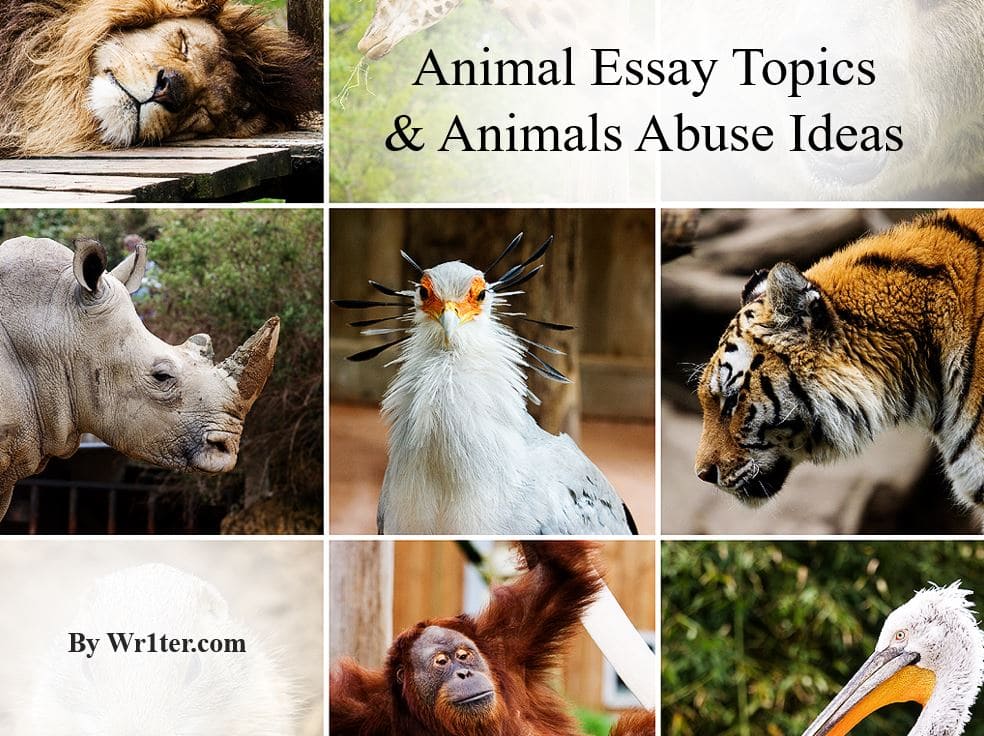Animal essay topics offer an incredibly diverse range of subjects for exploration and discussion. The complex world of animal behavior and cognition, for example, presents intriguing questions about the minds and emotional lives of different species. The critical issue of conservation, driven by deforestation, climate change, and poaching, invites scrutiny and advocacy. Likewise, topics centered around human-animal bonds and the therapeutic benefits of animal companionship can shed light on the emotional and psychological benefits of these relationships. Delving into these animal essay topics not only provides a good platform to express love and appreciation for the animal kingdom but also promotes crucial discussions about biodiversity, animal rights, and wildlife protection. From curious animal lovers to budding biologists, these topics offer a chance to engage with the wonders, challenges, and remarkable diversity of the animal world.
What Is an Animal Essay Topic and Its Purpose
According to its definition, an animal essay topic is a specific subject that centers on analyzing various aspects of animals, such as their behavior, adaptations, ecological roles, or the ethical issues surrounding their treatment and conservation. For example, the main purpose for selecting an animal essay topic is to encourage an in-depth analysis of complex relationships between humans and animals while also promoting awareness of a real importance of biodiversity and animal welfare (Jackson et al., 2020). Basically, common ideas can cover a wide range of subjects, from intricacies of animal physiology and ecology to discussions on wildlife preservation and ethical implications of using animals for research or entertainment. Further on, through critical examination, diverse themes allow students to explore how animals contribute to the environment, human culture, and science (Martin, 2023). In principle, they help readers understand ethical dimensions involved in human-animal interactions, whether concerning wildlife protection, domestication, or responsibilities humans bear toward animal conservation. Moreover, these subjects encourage an entire development of analytical skills by addressing complex questions, such as how human actions affect animal populations or moral obligations humans have toward non-human creatures (Rault et al., 2020). Thus, animal essay topics aim to deepen awareness of animal welfare, ecological balance, and broader implications of human-animal interactions.

How to Choose
Choosing a good animal essay topic requires a careful analysis and examination of several factors to ensure a subject is both engaging and academically appropriate. For example, students need to select relevant themes that align with their interests, which foster deeper research and a more enthusiastic approach to a writing process (Kleemola et al., 2022). In principle, common themes should have a sufficient scope for analysis, offering ample information and research material from reputable sources, such as scientific journals, books, and credible online resources. Further on, a good animal essay topic should present a balance between complexity and clarity, avoiding overly broad themes that lack focus while still allowing room for critical thinking and detailed examination (Poirier et al., 2024). As such, students should consider a current relevance, particularly in subjects related to conservation, animal ethics, or environmental changes, because these themes are likely to engage readers and provide fresh perspectives. Moreover, ensuring that animal essay topics prompt discussions on ethical, ecological, or scientific concerns adds depth and significance to a whole composition (Mentan, 2022). Basically, students need to present original insights or unique viewpoints, enhancing an academic value of an entire work while ensuring. In turn, some steps for picking a good animal essay topic include:
- Identify Your Interests: Choose ideas related to animals that genuinely fascinate you, as it will make research and writing more engaging.
- Narrow a Scope: Ensure a theme is focused and specific to avoid covering a too broad subject, which can lead to superficial analysis.
- Consider Relevance: Select a relevant animal essay topic that addresses current issues in animal science, ethics, or conservation to provide a meaningful and timely discussion.
- Research Availability: Make sure there are sufficient academic sources and credible information available to support an in-depth exploration of a subject.
- Incorporate Ethical or Scientific Dimensions: Choose an animal essay topic that allows for analysis of moral or scientific considerations to add depth and critical thinking to a paper.
Best Animal Topics
- Conservation of Endangered Species: A Global Perspective
- Influence of Climate Change on Migration Patterns
- Coral Reef Ecosystems: Importance and Threats
- Ethical Considerations in Animal Testing
- Invasive Species and Their Effect on Biodiversity
- Disease Transmission Between Animals and Humans: Zoonotic Diseases
- Understanding Animal Communication and Language
- Adaptation Strategies of Desert Dwelling Creatures
- Marine Pollution: Effects on Aquatic Life
- Tracking Animal Population Dynamics Through Citizen Science
- Wildlife Trafficking and International Law
- Bee Colony Collapse Disorder: Causes and Consequences
- Genetic Diversity and Conservation of Rare Breeds
- Endocrinology of Stress in Captive Animals
- Effects of Deforestation on Primate Habitats
- Animal-Assisted Therapy: Benefits and Challenges
- Domestication and Its Genetic Implications in Animals
- Coping Mechanisms of Animals in Extreme Environments
- Birds of Prey and Their Ecological Significance
- Aquaculture Sustainability: Balancing Demand and Conservation
Simple Animal Topics
- Understanding the Social Structure of Ant Colonies
- Feeding Habits of Herbivorous Animals
- Life Cycle of the Monarch Butterfly
- Unique Defense Mechanisms in the Animal Kingdom
- Animal Habitats: From Deserts to Rainforests
- Migration Patterns of Arctic Birds
- Reptile Varieties and Their Characteristics
- Study of Amphibians: Frogs, Toads, and Salamanders
- Exotic Pets: Care and Ethical Considerations
- Exploring Nocturnal Animals and Their Adaptations
- Marine Life: A Glimpse Into the Deep Sea
- Mammalian Reproduction and Life Cycles
- Different Breeds of Domestic Dogs
- Hibernation and Estivation in Animals
- Bird Watching: Identifying Common Species
- Discovering Endangered Species on Our Planet
- Diet and Nutrition of Domestic Cats
- Understanding Animal Tracks and Signs
- Life in the Savanna: African Wildlife
Interesting Animal Essay Topics
- Exploring Speciation in Galapagos Finches
- Animal Sentience and Cognitive Capabilities
- Mimicry as a Survival Strategy in Nature
- Interpreting the Language of Dolphins
- Decoding the Dance of Honeybees
- Anthropomorphism: Human Perception of Animals
- Climate Change Effects on Polar Bear Populations
- Marsupial Diversity: Beyond Kangaroos and Koalas
- Biofluorescence and Bioluminescence in Deep-Sea Creatures
- Cryptic Species: Unraveling Hidden Biodiversity
- Wildlife Conservation Policies: Case Studies
- Symbiosis in Coral Reef Ecosystems
- Understanding Avian Navigational Abilities
- Extinct Megafauna and Their Ecological Roles
- Cephalopods: Masters of Camouflage and Deception
- Unveiling Mysteries of Animal Migration
- Animal Societies: Ant Colonies to Elephant Families
- Bizarre Mating Rituals in the Animal Kingdom
- The Biological Rationale Behind Animal Play Behavior
- Genetic Basis of Animal Domestication
Academic Level Difference
Academic level differences in animal essay topics reflect varying degrees of depth, complexity, and analytical focus required at each stage of education. At an elementary or high school level, common ideas center on a basic understanding, such as descriptions of particular species, their habitats, or general discussions on animal behavior and conservation (Poirier et al., 2024). In principle, these themes are more descriptive and aim to build foundational knowledge. At an undergraduate level, animal essay topics become more specialized, encouraging students to explore specific scientific, ecological, or ethical aspects of animals, such as effects of climate change on endangered species or debates over animal testing (Jackson et al., 2020). As such, they demand more critical thinking and integration of research-based evidence. For graduate and Ph.D. levels, animal essay topics require a high level of scholarly rigor, focusing on niche areas within zoology, animal ethics, or environmental policy (Mentan, 2022). Basically, diverse subjects involve original research, data analysis, or theoretical exploration, such as examining a genetic evolution of species or proposing new frameworks for wildlife conservation. Therefore, an entire progression in academic levels demands increasingly sophisticated analysis, comprehensive research, and an ability to engage with complex interdisciplinary questions within a broader context of animal studies.
Animal Research Topics for High School
- Exploring Birdsong: Music or Communication?
- Bats and Echolocation: A Deep Dive
- Insects as Indicators of Environmental Change
- Chimpanzee Social Structures and Behaviors
- Penguin Adaptations for Harsh Climates
- Exploring Threats to Sea Turtles Populations
- The Fascinating World of Spider Webs
- Investigating Adaptations in Desert Animals
- Venomous vs. Poisonous: Animals’ Defense Mechanisms
- Elephants: Intelligence and Emotional Capacity
- Dietary Habits of Carnivores, Herbivores, and Omnivores
- Snake Behavior: More than Just Slithering
- Study on Monarch Butterfly Migration Patterns
- Endangered Species and Conservation Efforts
- Bees and the Importance of Pollination
- Animal Camouflage: Examples and Effectiveness
- Dolphin Intelligence: Evidence and Examples
- Physiology of Flight in Birds
- Gorillas: Social Behavior and Habitat Loss
- Reptile Biodiversity in Rainforest Ecosystems
Animal Research Topics for College Students
- Marine Biology: The Complex Ecosystem of Coral Reefs
- Microorganisms in the Rumen of Cows: How They Aid Digestion?
- Animal Assisted Therapy: Benefits and Challenges
- Physiological Impact of Climate Change on Polar Bears
- Ethology: Aggression in Animal Species
- Cephalopods and Camouflage: An Exploration
- Study of Animal Cognition: Intelligence in Non-Primates
- Threats Facing the African Lion: Conservation Strategies
- Environmental Stressors and Their Effects on Amphibians
- Biotic Factors Influencing the Habitats of Whales
- Parasitology: Host-Parasite Relationships in Animals
- Investigation into the Social Behavior of Wolves
- Comparative Analysis of Primate Communication Systems
- Cross-Species Disease Transmission: From Animals to Humans
- Aquatic Toxicology: How Pollution Affects Aquatic Life
- Animal Welfare in Agriculture: Ethics and Practices
- Population Dynamics of the Snow Leopard in the Himalayas
- Exploration of Bioluminescence in Deep-Sea Creatures
- Hibernation Mechanisms in Mammals: A Comparative Study
Animal Essay Topics for University
- Ethical Implications of Animal Testing in Biomedical Research
- Conservation Strategies for Endangered Marine Mammals
- Animal Cognition and Intelligence: A Comparative Analysis
- Human-Wildlife Conflict and Its Ecological Consequences
- Evolutionary Adaptations of Predators and Prey
- Genetic Diversity in Captive Breeding Programs
- Habitat Fragmentation and Its Effects on Biodiversity
- Animal Rights Movements and Their Influence on Public Policy
- Ecological Importance of Insect Pollinators
- Social Structures in Pack Animals: A Comparative Study
- Impacts of Urbanization on Wildlife Populations
- Behavioral Changes in Domestic Animals Through Selective Breeding
- Legal Frameworks for Protecting Endangered Species
- Roles of Apex Predators in Regulating Ecosystems
- Ethics of Wildlife Tourism: Benefits and Detriments
- Human Domestication of Animals: Historical and Cultural Perspectives
- Behavioral Ecology of Social Insects: Ants and Bees
- Invasive Species and Their Effects on Native Animal Populations
- Marine Conservation Policies and Their Effectiveness in Protecting Fisheries
- Reproductive Strategies in Amphibians: A Comparative Study
Animal Essay Topics to Research
- Migration Patterns: Mystery of Monarch Butterflies
- Biodiversity Loss: Consequences for Global Ecosystems
- Chimpanzee Cultures: Differences Across Africa
- Eco-Physiology of Desert Creatures: Surviving Extreme Conditions
- Animal Ethics: Questioning the Use of Animals in Research
- Unraveling the Secrets of Dolphin Communication
- Birdsong and Neurobiology: Insights into Human Speech
- Peculiar Reproductive Strategies in the Animal Kingdom
- Killer Bees: An Invasive Species Spreading Fear
- Insects as Pollinators: Their Importance in Agriculture
- The Vitality of Sharks in Oceanic Food Chains
- Life Strategies of Deep-Sea Hydrothermal Vent Fauna
- Venomous Creatures and Biomedical Research Opportunities
- Biomimicry: Nature’s Inspirations for Technological Advancements
- Hybridization in the Wild: Case of the Coywolf
- Decoding the Waggle Dance of Honeybees
- The Secret Lives of Bats: Echolocation and Beyond
- Resilience in Nature: How Animals Recover From Disaster
- Bioacoustics in Animal Communication: From Insects to Whales
- Predator-Prey Dynamics in African Savannah Ecosystems
Animal Argumentative Essay Topics
- Zoo Ethics: Animal Rights Versus Education Benefits
- Veganism versus Meat Consumption: Gauging the Ecological Footprint
- Is Pet Ownership Compatible With Animal Rights?
- Whale Hunting: Cultural Practice or Inhumane Act?
- Genetic Engineering: Crossing Ethical Boundaries With Designer Pets?
- Animal Sentience: Do We Underestimate Non-Human Intelligence?
- Animal Experimentation: Is There a Justifiable Trade-Off?
- Hunting for Conservation: Paradox or Viable Strategy?
- Aquariums as Conservation Tools: Are They Effective?
- Wild Animals as Pets: Exploring the Controversy
- Endangered Species Act: Time for an Overhaul?
- Factory Farming: Is the Price of Cheap Meat Too High?
- Feral Cats: Euthanasia Versus Trap-Neuter-Return Programs
- Rewilding Efforts: Romantic Ideal or Feasible Conservation Strategy?
- Animal Performance: Should Circuses Stop Using Animals?
- Emotional Support Animals: Right or Privilege?
- Dissecting Animals in Education: Essential Learning or Outdated Practice?
- Animal Cloning: Promising Technology or Ethical Misstep?
- Invasive Species Control: Is Eradication Ethically Defensible?
- Wildlife Tourism: Conservation Tool or Harmful Industry?
Animal Persuasive Essay Topics
- Promoting the Adoption of Shelter Animals Over Breeding
- Animal Rights: Is It Time to Rethink Meat Consumption?
- Fur Industry: Time to Take a Stand against Animal Cruelty
- Exotic Pet Trade: Advocating for Tighter Legislation
- Embracing Insect Eating as a Sustainable Food Source
- Shark Finning: A Call for Global Ban
- Zoos: Enforcing Higher Welfare Standards
- Dairy Industry: Unmasking the Cruelty Behind Milk
- Captivity versus Conservation: The Case Against Marine Parks
- Illegal Wildlife Trade: Implementing Stricter Penalties
- Hunting Trophies: Upholding the Ban on Imports
- Rodeos and Animal Cruelty: Time to Say No?
- Animal Dissection in Schools: Advocating for Virtual Alternatives
- Greyhound Racing: A Sport or Animal Exploitation?
- Vivisection: Encouraging the Use of Non-Animal Testing Methods
- Dog Breeding: The Case Against Purebreds
- Bullfighting: A Cultural Tradition or Barbaric Sport?
- Horse Carriages in Cities: Romantic Charm or Animal Abuse?
- Culling Wildlife: Arguing Against the “Overpopulation” Myth
Animal Abuse Essay Topics
- Dissecting the Psychological Factors Behind Animal Cruelty
- Preventing Animal Neglect: Insights and Interventions
- Animal Hoarding: An Understudied Form of Animal Cruelty
- Addressing Puppy Mills: A Look at Inhumane Breeding Conditions
- Blood Sports: Unveiling the Truth Behind Dog Fighting Rings
- Cockfighting: Its Hidden Costs and Damages to Animal Welfare
- Exotic Animal Trade: Unseen Agonies of Captive Wildlife
- Dolphin Slaughter in Drive Hunts: A Call for Action
- Live Animal Markets: Uncovering the Injustices
- Investigating the Dark Side of the Horse Racing Industry
- Factory Farming: The Harsh Reality Behind Our Meals
- Cruel Practices in the Wool Industry: Shedding Light on Shearing
- Unregulated Breeding of Exotic Pets: Addressing the Hidden Cruelty
- Fur Trapping: An Unnecessary Tradition in Modern Society
- Unmasking the Cruelty in the Foie Gras Industry
- Live Baiting Scandal in Greyhound Racing: A Call for Change
- Misuse of Animals in Tourist Attractions: Riding Elephants to Harm
- The Dark Side of Circuses: Life Behind the Big Top
- Unveiling Animal Abuse in the Movie Industry: A Push for Change
Animal Debate Topics
- Zoos and Animal Welfare: Ethical Perspectives
- Should Animal Testing Be Abolished in Biomedical Research?
- Biodiversity Conservation: The Imperative for Animal Rights
- Interdisciplinary Approaches to Reducing Stray Populations
- Exotic Pets Ownership: Freedom of Choice or Animal Exploitation?
- Animal Intelligence: Reevaluating Cognitive Capacities of Non-Human Species
- Symbiotic Relationship or Exploitation: Pets and Their Owners
- Aquariums and Marine Parks: Conservation or Captivity?
- Considering Veganism: Ethical Obligation or Personal Choice?
- Lab-Grown Meat: A Viable Solution to Reduce Farm Animal Suffering?
- Pesticides and Bee Colonies: Environmental Ethics and Responsibilities
- Should Animals Have Legal Rights Comparable to Humans?
- Birdsong and Language: Understanding Avian Communication
- Hunting for Conservation: A Paradox or Viable Strategy?
- Ecotourism: Opportunity for Wildlife Protection or Threat?
- Horse Racing Industry: Sport or Animal Abuse?
- Dolphin-Assisted Therapy: Healing or Harmful Practice?
- Culling for Conservation: Justifiable or Short-Sighted?
- Should Service Animals Be Used in Mental Health Therapy?
- Anthropocentrism and Environmental Ethics: Rethinking Our Approach to Animals
References
Jackson, K. M., Stolley, K. S., & Payne, L. L. (2020). Animals and ourselves: Essays on connections and blurred boundaries. McFarland & Company, Inc., Publishers.
Kleemola, K., Hyytinen, H., & Toom, A. (2022). The challenge of position-taking in novice higher education students’ argumentative writing. Frontiers in Education, 7, 1–14. https://doi.org/10.3389/feduc.2022.885987
Martin, A. K. (2023). Animal research. The Moral Implications of Human and Animal Vulnerability, 117–150. https://doi.org/10.1007/978-3-031-25078-1_6
Mentan, E. T. (2022). English essay writing handbook. Authors’ Tranquility Press.
Poirier, N., Tomasello, S., & George, A. E. (2024). Expanding the critical animal studies imagination: Essays in solidarity and total liberation. Peter Lang.
Rault, J.-L., Waiblinger, S., Boivin, X., & Hemsworth, P. (2020). The power of a positive human – Animal relationship for animal welfare. Frontiers in Veterinary Science, 7, 1–13. https://doi.org/10.3389/fvets.2020.590867


